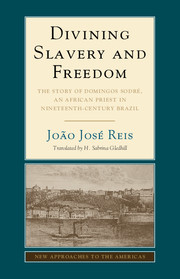 Divining Slavery and Freedom
Divining Slavery and Freedom Book contents
- Frontmatter
- Dedication
- Contents
- Preface
- Abbreviations
- Map
- 1 Cops and Candomblé in Domingos Sodré's Day
- 2 From an African in Onim to a Slave in Bahia
- 3 Domingos Sodré, Diviner
- 4 Witchcraft and Slavery
- 5 Witchcraft and Manumission
- 6 Meet Some Friends of Domingos Sodré
- 7 Domingos Sodré, Ladino Man of Means
- Epilogue
- Timeline of Domingos Sodré's Life
- Glossary
- Appendix 1 Domingos Sodré's Last Will and Testament (1882)
- Appendix 2 Domingos' Manumission and Manumissions Granted by Him
- Appendix 3 Delfina's Petition Guaranteeing Her Mental Health
- Illustration and Map Credits
- Bibliography
- Acknowledgments
- Name Index
- Subject Index
7 - Domingos Sodré, Ladino Man of Means
Published online by Cambridge University Press: 05 May 2015
- Frontmatter
- Dedication
- Contents
- Preface
- Abbreviations
- Map
- 1 Cops and Candomblé in Domingos Sodré's Day
- 2 From an African in Onim to a Slave in Bahia
- 3 Domingos Sodré, Diviner
- 4 Witchcraft and Slavery
- 5 Witchcraft and Manumission
- 6 Meet Some Friends of Domingos Sodré
- 7 Domingos Sodré, Ladino Man of Means
- Epilogue
- Timeline of Domingos Sodré's Life
- Glossary
- Appendix 1 Domingos Sodré's Last Will and Testament (1882)
- Appendix 2 Domingos' Manumission and Manumissions Granted by Him
- Appendix 3 Delfina's Petition Guaranteeing Her Mental Health
- Illustration and Map Credits
- Bibliography
- Acknowledgments
- Name Index
- Subject Index
Summary
Ladino: in the days of slavery in Brazil, the term identified Africans who were familiar with and could decode or adopt the local customs, including the language. Like many ladino African slaves and freedpeople, Domingos Sodré did not profess just one religious belief. He was both a Candomblé priest and a Catholic devotee. Like whites and other ladinos and Crioulos, he had learned to manipulate the means to get ahead in business and move forward in society. This is not to say that these values were absent in the Africa he had left behind, but once in Bahia, Domingos would begin to control new ways of manipulating, innovating, and transcending his circumstances. Let us start with religion.
SAINT AND ORIṢA
When he dictated his second will and testament in 1882, Domingos stated at the outset that he was a “true Christian,” with an emphasis that was far from the norm in such documents by the late nineteenth century. And he recalled being baptized in the catholically named plantation of Trindade (Trinity), which his former master owned in Santo Amaro da Purificação. He also remembered his marriage in 1871, before the Catholic shrine in his house, celebrated by an important member of the clergy, thereby legitimizing his long-term “illicit union” with his partner, Maria Delfina da Conceição, according to Canon Raymundo José de Mattos, the vicar of São Pedro parish, synodal examiner and professor of religious history at the Archiepiscopal Seminary in the Convent of Santa Tereza, a few yards from Domingos' home.
This was Domingos' second marriage. His first wife had been Maria das Mercês Rodrigues de Souza, with whom he also lived in a common-law union before they were married by the Catholic Church on June 9, 1850. She was seriously ill at the time and died about a month later.
- Type
- Chapter
- Information
- Divining Slavery and FreedomThe Story of Domingos Sodré, an African Priest in Nineteenth-Century Brazil, pp. 253 - 294Publisher: Cambridge University PressPrint publication year: 2015
